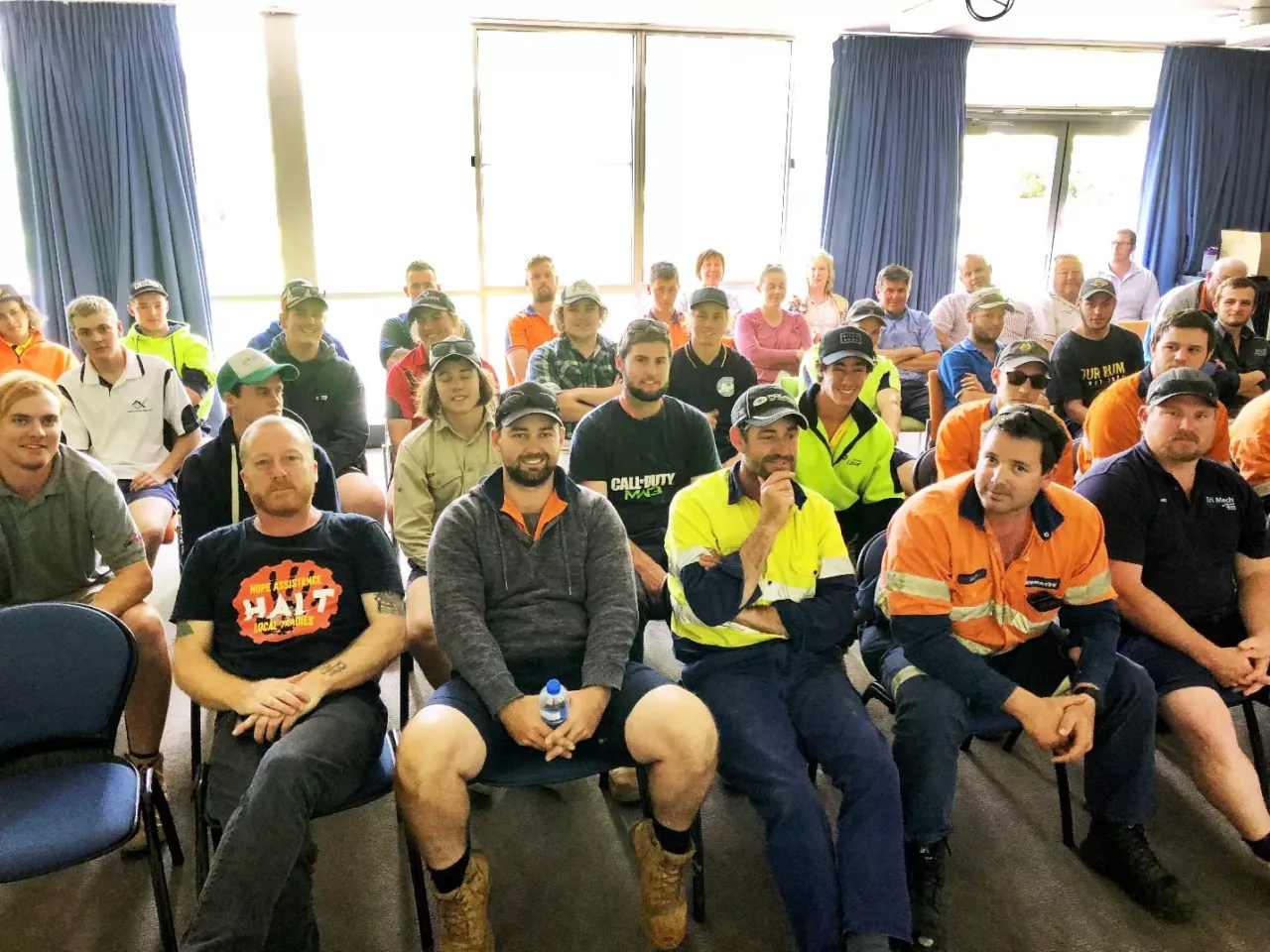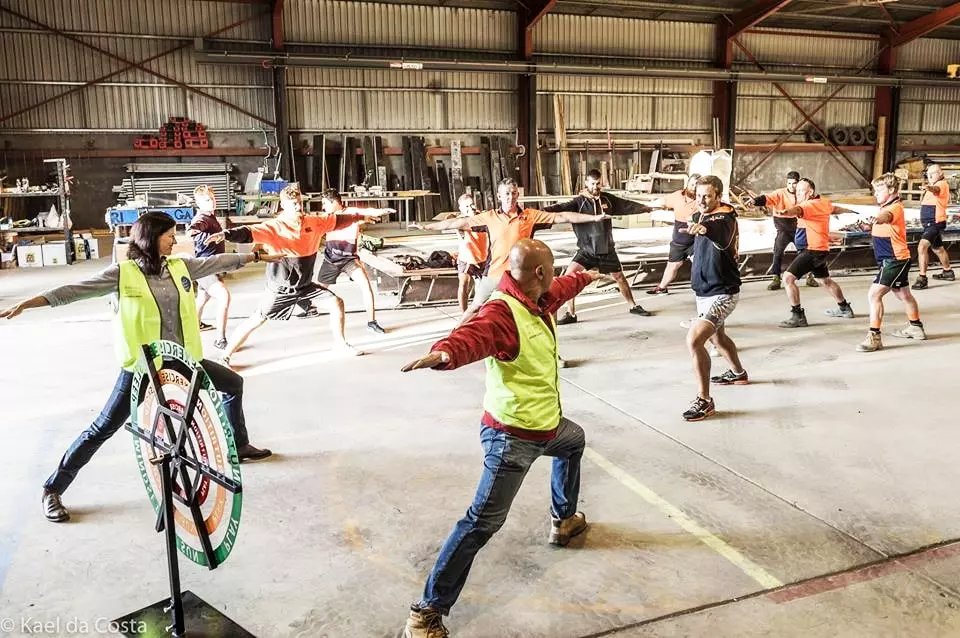The problem
Looks can be deceiving! Even more so in the Field Services industry! The tough exterior of these muscular blokes donning hard hats, boots and hi-vis shirts is hard to go unnoticed. But there is more than what meets the eye. Behind their rugged look, they have a soft core and they struggle with more professional and relationship problems than anyone else does.
“There is a pressure on men to work hard and financially support their family, along with the issues surrounding work, quotes, chasing money, tax, insurance, take a toll on men and if they haven’t got the mechanisms in place they can become depressed and possibly have thoughts of suicide,” says Jeremy Forbes, founder of HALT (Help Assistance Local Tradies).

Struggle to find the work life balance
Unfortunately, the effect of the struggles at work is not confined to the job sites. “There are tradies that spend too much time at work, who struggle to find the work-life balance, and lose touch with their family, this can have a detrimental effect on their relationship with their partner and children,” Jeremy explains. Statistics show that mates in the construction and similar trades are 70% more likely to commit suicide than their behind-the-desk counterparts. These men are also six times more likely to die from suicide than workplace accidents. It’s shocking and it’s heart-breaking! But why is it so hard for these blokes to open up and talk about their struggles? Jeremy believes the answer lies in the strong masculine culture we have been brought in and the expectations to conform to a certain stereotype. “This is generational, our fathers and their fathers didn’t talk about their problems and they instead suffered in silence.”
Jeremy lost too many mates to suicide and watched others suffer from mental health issues, relationship breakdowns and financial pressure, just because of this toxic stigma. When he founded HALT, it not only helped Field Service Suppliers relate to Jeremy’s own struggles fighting depression and suicidal thoughts but is now also giving them the courage to confide about their mental health with their loved ones and find help. After conducting over 200 events over the last 5 years, in settings that are socially inclusive for providers, such as hardware stores and Footy’s clubs, Jeremy believes, on an institutional level, still a lot needs to be done as a community to break through the stigma for service providers to get help for themselves or help their mates. Fortunately, Jeremy is not alone.
TradeMutt, an initiative taken by Carpenters Ed Ross and Dan Allen in partnership with TIACS (This is a Conversation Starter), has been creating work shirts for Field Service Suppliers to encourage people to start a conversation around suicide amongst Australian men, in particular those in trades.

How to find out if someone is going through anxiety or depression
The tricky part is to find out if someone is going through anxiety or depression and needs help.
While it’s difficult to say if you are capable of solving anyone’s problem, Dan notes that spending 8 or more hours a day together, work mates are in a good position to identify when someone is not quite themselves, or something is not quite right with someone’s behavior.
The question is how do you begin this difficult conversation with someone you think needs help? When discussing it’s important to make them feel comfortable before expecting them to open up, says Dan.
“Just because we may be ready to have the conversation with someone who we identify as maybe needing some help, it does not mean that they are.”
This conversation can take place over a coffee or beer and needs to be casual and light hearted in order for the individual to share their problems with you on their own, suggests Dan. “Your sole purpose is to empathize and listen.
Listening to someone while you give them the opportunity to vent can be one of the most healing things for someone in a bad situation.
”Given the fact that financial crisis and work-related pressures are some of the main triggers behind a person’s decision to take their own life, is there something the employers can do to reduce anxiety and depression among their workers? Pip Sheldon, founder of The Healthy Tradie Project thinks the answer is a big “YES”.
“Statistics show that every second day a construction worker takes their own life. The construction industry is fraught with pressure. Long working hours, physically demanding work and constant pressure to perform. If we are to stem the tide of suicide, it is critical that workplaces, particularly construction sites, stop and recognise the impact of industry pressure on the health of Tradies,” says Pip, who lost her brother Dale, in 2009 to suicide.
Dale was a carpenter and only 35 years of age when he died. So Pip gives these service providers something different than their typical toolbox talk. Physical movement and mindfulness classes that help them respond instead of reacting to stressful situations.

“I believe that our physical, mental and emotional health are all connected – you can’t have a healthy mind without a healthy body. At the Healthy Tradie Project, we focus on the body, the mind, nutrition and lifestyle behaviors like sleep and play to achieve a healthy and balanced life.”
Pip adds that if an organization depends on people, which most in the construction industry does, then the wellbeing of those people should be a fundamental consideration for the employers in order for the workers to perform at their best.
Pip’s suggestion about the role of employers falls in line with a recent research from Mates in Construction, a suicide prevention organization focused on helping Field Servcie Suppliers with mental health.
It all starts with reducing harmful exposures in the workplace such as excessive job demands, low reward and recognition, bullying, low job control and job insecurity. Social support from colleagues by highlighting positive aspects of work is one way of overcoming it, suggest the MIC research.>
Additionally, employers need to provide mental health and suicide prevention literacy to facilitate help-seeking behavior while ensuring the presence of a trained individual on site to identify mates that need support and refer them to appropriate professional services to aid early intervention and treatment.
Finally, employers need to encourage workers treated for mental health to join back when the treatment is completed and they are ready to welcome life with open arms.
“Return to work can be a challenging time for workers who have experienced mental health problems. This process can be eased by ensuring that workers returning to work enter into a supportive environment that is free of stigma. Ongoing support also refers to bereavement support in the case that a worksite loses an employee to suicide,” MIC notes.
Wrapping it Up
With so many painful stories of Field Service Suppliers trying to find solace in suicide, it’s time we play our part as employers, partners, friends, colleagues and as a nation, to add this emotional muscle to their tool box.
Dan puts it beautifully: “We need to actively engage in empathy, forgiveness and a non-judgmental approach to life. By doing this we make mistakes and perceived weaknesses less of an issue than what society currently dictates.”
However, the fact of the matter remains that no one can help you unless you are willing to help yourself. So as a service provider whenever you are feeling the work pressure is getting too much, put down your tools and take some time to recharge.
The symptoms of a deteriorating mental health might be hard to catch in the beginning, but a wandering focus and becoming less efficient at work, are definitely things you should not ignore, says Matt Reynolds, Trades Services Specialist, Advisor and Podcast host at XRM.
“The key is to schedule your ‘recharge time’, so it becomes a priority,” suggests Matt. “Relaxation is different for everyone. Talking to a friend, a game of golf, sport of fishing or a weekend getaway. Anything that helps you wind down from the daily grind is probably a step in the right direction. You are also much more likely to be happier and feel good, creating a ripple effect and passing good vibes on to those around you.”
About i4T Global
Here at i4T Global, we help Field Service Suppliers and Authorized Service Agents get back their work-life balance with a complete cloud based Field Service Management solution that can take care of every aspect of job service delivery. From responding to quotes to job scheduling, employee GPS tracking, visual job recording, electronic invoicing and lead generation with simple social media management.
Get a 2 Week Free Trial and watch how you can enhance efficiency and transparency for your business.
Hot off the press!

With our cutting-edge technology and in-depth knowledge of how the Field Service Management sector operates, the i4TGlobal Team loves to share industry insights to help streamline your business processes and generate new leads. We are driven by innovation and are passionate about delivering solutions that are transparent, compliant, efficient and safe for all stakeholders and across all touch points.




